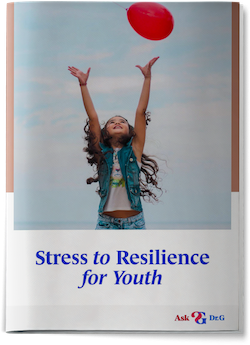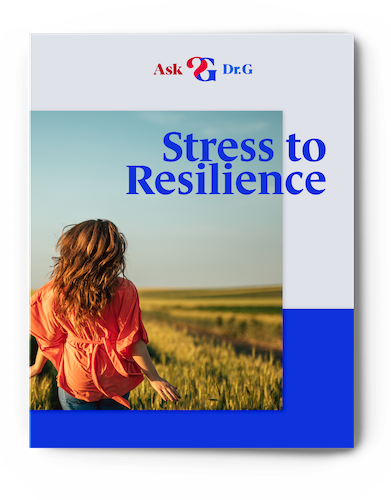How do you deal with your kid picking up behaviors from other kids? My specific situation was that an old college friend came to visit and stay with me for a few days, and her daughter sneaks around and did things that she was told not to do. She also whined constantly. My kids know that these are unacceptable behaviors, but they started doing them. The old standby “We have different rules for our family” isn’t working. We visit these friends once or twice a year. I need to figure out how to deal with this!
Anonymous, on Facebook
What is really awkward is not the other kids’ behavior. If your kids don’t do these things, it’s because you taught them not to. The problem is you don’t want to make your parenting an attack on your friends’ parenting.
When we watch a child whine or sneak around or disobey (old-fashioned word, I know), and then scold our own kids for doing the same, it’s like saying: “Hey, your parenting sucks!” So we hold back, don’t give consequences or try to teach our kids without anyone noticing. This can work. It is worth being respectful, especially in someone else’s home. The trick is to warn your kids before hand, and decide on your own limits.
At their house:
Have a conversation (or three) before you get there. This of course depends on the age of your kids, but if they are verbal, this will help. “Lee sometimes does things we don’t respect. She whines, or isn’t honest or good to her parents at times. What should we do if you start to behave that way at their house too?” Acknowledge that it is hard to be “good” when someone else is misbehaving. Let you kids talk about their feelings about her behavior or about your rules. Don’t change your rules, but it’s great to show some empathy. After all, it is not fair that they have to behave ALL the time. It’s right, but not fair. For younger kids, come up with a secret signal for great choices and a different signal for “oh, careful!”
Plan how you will let them know if they have crossed the line. Let them know what the consequences will be if they can hold it together and be great, and what will happen if they don’t. If you’re going for an extended visit, make sure you get some “family time” while you are there away from your hosts. This is good for your kids and will give you a chance to reinforce their good choices, or recreate your plan if it isn’t working.
At your house:
I actually think this one is harder. Not only do you need to be clear and consistent about the rules in your own home, but kids want you to enforce your rules to all the kids in your home. It is more “unfair” in their minds if another four year old gets away with throwing your kids’ toys when that isn’t allowed. I think some prep before the visit will help your kids understand the situation.
The best solution is the hardest one. Talk to your friend. Let her know that you need to enforce your family rules for all the kids in your home. Don’t criticize her child or her parenting, and stay away from the whining. Just ask her help in establishing the “stuff” rules. If this kiddo is sneaking food or TV time or something else tangible, these are good topics to discuss. If you can, throw the blame back on yourself and your kids. “We’ve been having some challenges with our kids lately, so we’re trying to be really consistent.” Or blame it on me! “I read Dr. G’s website and she says kids are too confused by different rules for friends in the house, so the only way we can expect our kids to follow our new rules is if we ask everyone to follow them.” *
This is HARD! Do you risk the friendship if you talk to her? Probably not, especially if you present it as a problem of your own that you need her help to solve. We love to help our friends, and it may make it easier for her to talk about her own parenting struggles. She may even be inspired by you! Most of us know that we don’t want whiny, sneaky kids and are just looking for a way to change the course.
*It’s true – I think that kids respect us and our rules more if we aren’t afraid to say that they are for all the kids in the house.
Anybody else have suggestions about this tricky situation?




8 thoughts on “My Friend’s Bad Parenting is Poisoning My Kids!”
I actually lost a friend over this very thing…she started walking in our house telling her kids to do whatever my husband said and he was to lay down the rules which was fine until WE were left responsible as she had no intention of holding her kids to our rules apparently. Kind of backfired..this is really a tough one. My suggestion is to find other parents who don’t let the kids run the show, or at least have a similar parenting style. Rock and a hard place..
It is absolutely a great solution to find like-minded friends with kids. In this situation, I hear the mom saying she wants to continue the relationship and staying in each others’ homes. Also, I think a lot of people end up in this situation with family members (sisters, brothers, cousins and their kids) who have really different parenting styles or values. I’m hoping that, by asking her friend for some help, they can improve the parenting AND preserve the relationship. May not be possible though.
Nicely written and good points. But I don’t see why you can’t tell your child “No” about a certain inappropriate behaviour in front of the other parent and child.
I understand that it tells the other parent, as you put it, “Hey, your parenting sucks!” But at the same time, I don’t see why your own child’s misbehaviour cannot still be addressed then and there while it is still fresh in your child’s mind and when it is most beneficial to address.
Once, a child hit my daughter so she hit him back. I told her we don’t hit and she said that the other child’s mommy didn’t stop the other child. I told her “I don’t care about what another child and their mommy do. I care about you and that you know what is right.” The other mommy made an excuse that boys are aggressive and it means he likes her. I told her that I found it hurtful that she would teach my daughter that a boy hitting a girl means he likes her. She isn’t my friend anymore. Which is fine. My child comes first. And I cannot be friends with anyone who thinks that a man hitting a woman (or a boy hitting a girl) means he likes her. Her son is now in therapy for being very aggressive and has physically attacked many children before the mom figured out there was a problem. Sometimes, it’s worth doing what you said not to do.
Polish Mama, I completely agree with you. Telling your child “no” in front of another family (exhibiting the same bad behavior or worse) sends a strong message to your children. And some friendships are NOT worth preserving. You made a strong mom decision to both protect your daughter and point out your “friend’s” sexist and dangerous belief. That is some excellent parenting. It is often worth standing by your parenting principles, friendship be damned.
However, if you can do the parenting your child needs AND treat the other person respectfully, this too is a good lesson for our kids. In your situation you had to make a choice. I’m not convinced the mom who asked this question does have to make that choice. Unless this little girl’s behavior is damaging or worsens, I think that she can appeal to her friend’s compassion and good instincts. This may even have the benefit of opening conversation and improving all the relationships involved. Here’s hoping!
If the child is in appropriate age, and he is doing things at my house that are against our rules, I approach nicely to the child (instead if approaching the mom) and asks him not to do it, such as not eating food upstairs, or not playing with ball at the house. In many cases my kids would tell the child -“hey, you can’t do it in our house”. But I can say that we encountered some situations when my friend’s kid was speaking in a terrible way to her, and after they left Ii made sure that my kids know that this is not the way a kid speaks to his parent.
Michal, you bring up a great point. Our kids may start to behave worse when they spend time around children who do, but they also notice the bad behavior. Using these interactions as teachable moments for our kids can make a big impact. They would much rather discuss someone else’s bad behavior than their own! A great chance to ask our kids what they noticed and what they think about it.
I think you made some really valuable points! Another suggestion I would offer is getting a gauge from your own child on how the feel about the other child’s behavior. (but not in front of the other family) It really can be a perfect opportunity to highlight behavior that doesn’t work and explain why. If the child is not following house rules, I think its important for your own child to feel comfortable and responsible enough to call out their friend (respectfully) and highlight a rule or option that works for your family. Not only do we want them to follow or agree to our rules, we want them to be comfortable speaking up for what they know or believe is right.
Thanks Lynn. I agree, giving your child some of the authority to say “This is a rule in our home” teaches a great lesson. As Michal mentioned (above), when kids feel empowered to do this, it has a strong impact on the visiting child. I get the sense that this mom’s kids are a little young to do this reliably, but encouraging them to is a good idea.
Comments are closed.